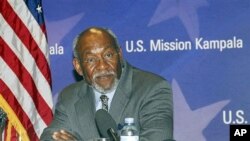The United States on Thursday criticized an assertion by Sudanese President Omar al-Bashir that Khartoum will not recognize South Sudan as independent, if it claims the disputed Abyei region. South Sudan is set to become fully independent in July.
The State Department’s top Africa diplomat is framing Bashir's comments on Abyei as unhelpful, and is urging leaders in Khartoum and the southern capital Juba to recommit to negotiations to settle remaining north-south disputes.
The Sudanese president has pledged to respect the results of the January referendum, in which southern Sudanese voted overwhelmingly for independence to take effect on July 9.
But the process appeared to hit a snag this week when Bashir said his government would never recognize an independent south, if it tries to claim the oil-rich central Abyei region.
In a talk with reporters here, Assistant Secretary of State for African Affairs Johnnie Carson said the parties need to set aside threatening rhetoric and peacefully settle their remaining issues under their 2005 Comprehensive Peace Accord, or CPA, before July.
"Those comments are not helpful at all, and they only serve to inflame and heighten tensions. It is important that both sides - those in Khartoum and those in Juba - focus intensely on trying to resolve the key issues that have not been completed under the CPA. Abyei is one of them. This must be done before July 9. And it important that President Bashir and the President of South Sudan, Salva Kiir, continue to meet, negotiate, to resolve these issues as quickly as possible," he said.
Carson also said he has intervened with Uganda’s government over its treatment of opposition leader Kizza Besigye, who was arrested on Thursday for the fourth time this month.
Besigye, who finished second in Uganda’s February election behind President Yoweri Museveni, has been leading protests in Kampala against alleged corruption, and soaring food and fuel prices.
Carson said he telephoned Ugandan Foreign Minister Sam Kuteesa earlier Thursday to protest what he said was the apparent serious mistreatment of Besigye, and the arrests of other opposition figures.
"We have expressed our concern about what appears to be harassment of Dr. Bisigye. I have myself spoken to the Ugandan foreign minister about this, and have urged that the Ugandan government act in both a responsible and civil fashion in dealing with the arrest of individuals attempting to carry out peaceful protests," said Carson.
Carson said he urged reconciliation and the opening of political space for peaceful protests in Uganda, and said he was told that Museveni plans to meet opposition leaders next week to ease tensions.
The assistant secretary, who was among international observers of Nigeria’s April 16 presidential election, hailed the country’s multistage electoral process this month as its most successful since the end of military rule in 1999.
He said the United States deplores the widespread lethal violence in northern Nigeria that occurred after the reelection of President Goodluck Johnson was confirmed.
But Carson said that overall, U.S. officials noted a more responsive security presence and hope that the latest elections, while imperfect, will provide "a baseline" for further improvement in a historically trouble-ridden process.




